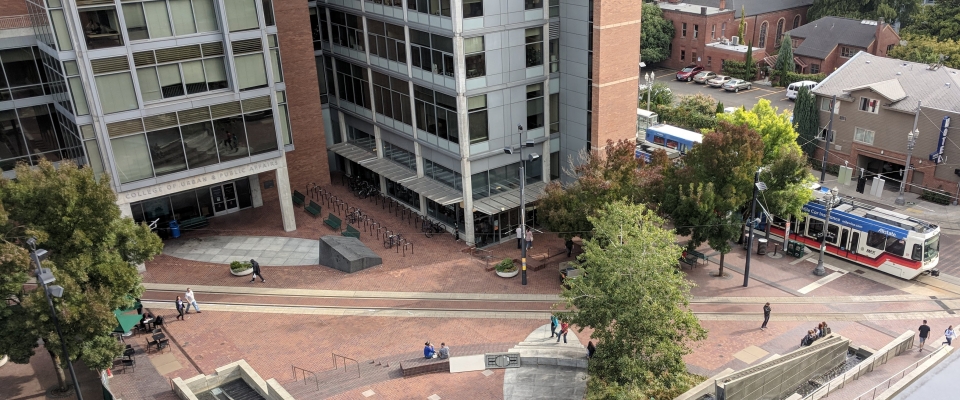What Makes Transportation Unique at Portland State University?

Transportation defines Portland, Oregon. Portland State University (PSU) shapes transportation professionals who, in turn, shape cities across the world. Our students conduct cutting-edge research under the guidance of the world’s foremost transportation research faculty at PSU - from both the Toulan School of Urban Studies & Planning and the department of Civil & Environmental Engineering of MCECS.
WHAT MAKES TRANSPORTATION UNIQUE AT PORTLAND STATE UNIVERSITY (PSU)?
A PSU research center dedicated to transportation: Students have the advantage of TREC - the Transportation Research and Education Center which is home to one of five national university transportation centers. We lead the National Institute for Transportation & Communities (NITC), a six-university consortium that receives an average of $4.4 million per year from the U.S. DOT to support transportation research projects and students. PSU also supports other related research centers on smart cities, population, aging and more.
An active and engaged student transportation group: The ITE student group, Students in Transportation Engineering & Planning (STEP), hosts film screenings, tours of transportation agencies in the city, lectures and other activities. Students can take on leadership roles in cultivating community and education around the transportation issues important to them.
Exposure and opportunities nationwide: Students present their work at national conferences for TRB, ITE, APA and more. They also get opportunities at local events such as our online TREC seminars, webinars, and our flagship conference each fall, the Transportation & Communities Summit.
Scholarship opportunities: TREC offers a variety of scholarships for transportation students, especially those with an interest in multimodal and sustainable transportation systems.
Community-engaged projects: Through the Master's in Urban and Regional Planning (MURP) program, students work with local agencies and transit providers to solve real-world problems, creating significant change in the Portland Metro region. Read more reasons to join the MURP program or join us for an online info session on Dec. 13th.
Award-winning students: This past year, four PSU civil engineering students won prestigious Eisenhower fellowships from the U.S. DOT. PSU students have also received Eno fellowships, WTS Scholarships, and NITC dissertation fellowships.
Sustainable Transportation Study Abroad Program: We host an annual two-week study abroad course in the Netherlands. Students tour the region on bicycles and meet with Dutch planners and engineers to understand their unique, people-focused transportation system.
Faculty leaders in research: Our core transportation faculty are regarded as national and international experts in their fields. Graduate students have opportunities to collaborate in this research and take the lead on their own papers under faculty guidance.
The city of Portland: Portland offers an engaged community and innovative policymakers, willing to try “urban prototyping” to explore new ideas and applications. This is in part due to our ability to observe changing conditions and test new engineering solutions on the ground.
TRANSPORTATION DEGREE PROGRAMS AT PSU & HOW TO APPLY
Portland State offers a wide variety of degree programs suited to the multi-disciplinary demands of a career in transportation. Curious about the courses offered? See an overview of graduate courses in transportation at Portland State.
Undergraduate Degree Programs
We offer undergraduate programs in civil engineering, supply and logistics management, and community development, which lay the foundation for our transportation graduate programs.
Graduate Degree Programs (Professional)
Master of Urban and Regional Planning is a two-year, 72 credit professional degree program designed for those interested in working as professional planners. Admissions are accepted for fall term only. The deadline for Fall 2019 is January 15. Join us for an online info session Thursday, December 13.
Master of Engineering in Civil and Environmental Engineering is a non-research based professional degree designed to put you on track for careers shaping the future of transportation with local governments, consulting firms and other organizations. The priority deadline for the fall term is January 7.
Graduate Degree Programs (Research)
The Master of Science in Civil and Environmental Engineering (apply by January 7) and the Master of Urban Studies (apply by January 17) are suited for those seeking careers in a broad range of transportation professions or in academia.
Graduate Dual Degree Program in Transportation
For those seeking a degree rooted in both transportation planning and engineering, we offer a Dual Master’s Degree Program in Transportation, allowing students to obtain a Master of Urban and Regional Planning and Master of Science in Civil Engineering at the same time. Students should connect with advisors, as dual degree options require careful planning. Email askusp@pdx.edu if you are interested in learning more about these programs.
Graduate Certificate in Transportation
The two disciplines also collaborate to offer a Graduate Certificate in Transportation for established professionals looking for a deeper understanding of transportation disciplines.
Doctoral Degree Programs
Our Ph.D. in Civil and Environmental Engineering and the Ph.D. in Urban Studies, help shape researchers into the top experts in their fields. Portland State students publish as lead authors at a greater rate than most universities and are disproportionately represented at forums including the annual meeting of the Transportation Research Board of the National Academies.
The Transportation Research and Education Center (TREC) at Portland State University is home to the National Institute for Transportation and Communities (NITC), the Initiative for Bicycle and Pedestrian Innovation (IBPI), and other transportation programs. TREC produces research and tools for transportation decision makers, develops K-12 curriculum to expand the diversity and capacity of the workforce, and engages students and young professionals through education.
